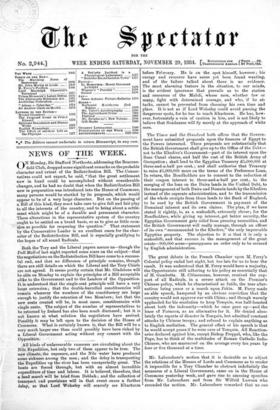Mr. Labouchere's motion that it is desirable so to adjust
the relations of the Houses of Lords and Commons as to render it impossible for a Tory Chamber to obstruct indefinitely the measures of a Liberal Government, came on in the House of Commons yesterday week, and gave rise to amusing speeches from Mr. Labouchere and from Sir Wilfrid Lawson who seconded the motion. Mr. Labouchere remarked that no one
would think of proposing to have hereditary Academicians ; nor, though the Poet-Laureate had been made an hereditary legis- lator, would they dream of making his son an hereditary Poet. Laureate. Even the fresh blood, as it was called, poured into the Peers, was not all of it highly charged with intellectual potency. Some of the new Peers were made because they had been able Ministers, and some because they had not been able Ministers. As for heredity, it was well known, according to Mr. Labouchere, that men inherit their intellectual faculties from their mothers, and not from their fathers. Lord Chancellors, for instance, had not succeeded in transmitting their talents to their sons. What would the Conservatives say if they had to submit all their legislation to a House of 500 hereditary Radical shoemakers ? Yet that was not at all a more absurd arrangement than the arrangement now made for the Liberals when they are in power. Sir Wilfrid Lawson followed this up by remarking that it was certain there was no need of a check on Liberal legislation while the Member for Bridport (Mr. Warton) was in the House ; yet it was by no means certain that even that honourable Member's eldest son would be a fit check on legislation. The present House of Lords dealt with Liberal legislation much as the author of a recipe for making a salad who concluded it with the direction, "And then throw it all out of window," had directed his salad to be dealt with, and it needed nothing but common-sense to see that such a system was absurd.







































